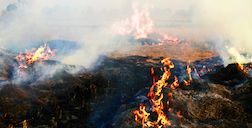 The brief, submitted jointly by the Professional Services Council (PSC) and the National Defense Industrial Association (NDIA), is stark in its position with regard to burn pit litigation that targets military contractors such as Kellogg Brown and Root Services Inc. (KBR).
The brief, submitted jointly by the Professional Services Council (PSC) and the National Defense Industrial Association (NDIA), is stark in its position with regard to burn pit litigation that targets military contractors such as Kellogg Brown and Root Services Inc. (KBR).“It is regrettable that anyone – soldiers, federal civilian employees, or contractors may have been injured or become ill,” said Alan Chvotkin, PSC Executive Vice President, Counsel and a co-author of the brief in a statement released in tandem with the filing on November 21. “But the military's operational decision to use burn pits at forward operating bases was made with full knowledge of the potential health risks to those nearby.
“Our goal in filing this amicus brief is to provide the Court with an industry-wide perspective on the practical reasons why litigation like this should not be allowed to proceed.”
Here, the joint submission is blunt.
“Subjecting the US military’s support contractors to the substantial burdens, expenses and risks of litigating (or settling) state tort suits for combat-zone injuries allegedly attributable to their contractual performance would discourage or deter [contractors] [sic]from bidding on high-risk work and / or interfere with their implementation of military directives,” the amicus brief explained. “That in turn,” Chvotkin said, “would be detrimental to national defense interests” including the military’s reliance on services contractors for combat-zone logistical support.
In other words, while the military is already off limits with regard to burn pit litigation, so too are contractors that do the bidding of the military. They’re just following orders. If the military decides to use open burn pits rather than truck waste and refuse out of harm’s way, that’s a military prerogative that cannot be questioned. And a contractor having bid on a military contract (pending health and safety issues notwithstanding) and having that bid accepted thereby securing the contract, the contractor is beholden to the military (which is shielded from litigation). Thus, it’s only fair that the contractor is shielded as well, if for no other reason than to ensure the willingness of contractors to step to the plate and bid on military work, and to protect that pipeline of supply.
As for military personnel subjected to the inhalation of chemicals from military waste, they appear to be left out in the cold. To that end, the amicus brief urges the Court to apply its “battlefield contractor” case law precedents by affirming dismissal on the grounds that the litigation is barred by both the “political question” doctrine, and “combatant activities” preemption.
“It is regrettable that anyone – soldiers, federal civilian employees, or contractors may have been injured or become ill, but…”
Iraq burn pits, as well as those in Afghanistan were installed, and utilized in war zones between 2003 and 2010. Veterans, such as Sgt. James Powers of Massillon, Ohio liken the burn pit issue to the Agent Orange controversy stemming from the Vietnam War. In testimony to the Committee on Senate Veterans Affairs on November 21 of this year, Sgt. Powers noted his service in the US Army and the Ohio Army National Guard for a combined 12 years, including deployment in support of Operation Iraqi Freedom in 2009 through 2010.
His primary injury is Post-Traumatic Stress Disorder (PTSD), from which he continues to recover with some difficulty. However, he referenced military waste burn pits this way:
“Disability claims/issues [sic] with Burn pit exposure are beginning to seem just like Vietnam veterans who are still fighting about Agent Orange.” What Sgt. Powers is referencing here, are claims for compensation through Veterans Affairs for exposure to something that occurred some 50 years ago.
Will those who served in Iraq and Afghanistan and were affected by burn pit exposure still be fighting for compensation 50 years from now?
We know they can’t litigate against military contractors, if the amicus brief referenced above is adopted.
There may be help on the way – but not on the litigation front, at least initially. On November 21 a Colorado lawmaker introduced legislation in Washington to create a health insurance program for veterans that would use civilian medical providers in the private sector at taxpayer expense.
READ MORE BURN PIT LEGAL NEWS
In the meantime, the US Court of Appeals for the Fourth Circuit may choose to affirm, or deny the ruling of the lower Court in Maryland to dismiss multidistrict class action burn pit litigation.

READER COMMENTS
Gary Tagg gary03tagg
on